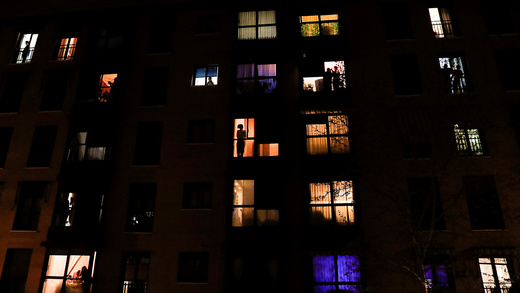Hotline, shelter calls haven’t risen, but pandemic can increase threat of domestic violence

The COVID-19 stay-at-home order has seen many unintended consequences, one of which is that victims of domestic violence are now stuck at home with abusers for an unknown period of time.
Florida is ranked fourth in the country for the most attempts to contact the National Domestic Violence Hotline, with 12,146 contacts last year. The hotline provides help for trapped victims on its website, stating that abusers may use the COVID-19 outbreak as a tool to manipulate victims into staying with them. Abusers could withhold insurance cards, disinfectants, medical information from the Centers of Disease Control and Prevention or medical attention to force victims to stay home.
In April, a WTSP News report warned Hillsborough County citizens of a probable surge in domestic violence. Tampa Bay abuse shelters started to prepare for the worst, knowing that being stuck at home with an abusive family can only exacerbaate domestic abuse.
Surprisingly, though, isolation due to the coronavirus has shown to be less of a problem for hotlines and shelter workers than they anticipated. The number of calls hasn’t increased since April, despite the probable rise of at-home violence during the COVID-19 pandemic, the Fort Lauderdale Sun Sentinel reported.
Women in Distress, a domestic violence organization in Broward County, reported to the Sun Sentenial that they fear the lack of calls means victims are not aware they can receive help during the pandemic.
This phenomenon is not uncommon. During holidays, when families are together and children are out of school, domestic violence rises while reports of abuse decline. In 2016, the National Abuse Hotline reported that its average of 829 calls per day was almost cut in half from Thanksgiving to New Year’s Day.
Police and domestic violence professionals suspect that the stress of being at home creates both the inclination to abuse and the hesitation to report, according to the Sun Sentinel. The New York Times reported that those who have recently lost their jobs due to the COVID-19 pandemic now deal with extra stress, creating a more dangerous environment for victims.
Some have no choice but to live with their abuser at this time. One anonymous woman told the New York Times that she had recently been freed from an abusive relationship, but losing her job due to the pandemic has given her scarce options for a living situation.
This woman’s situation could be all too familiar to victims in Hillsborough County. There are 12 domestic violence shelters around the Tampa Bay area. Unfortunately, facilities are either separating occupants who are unrelated to each other or closing completely to avoid further spread of the coronavirus, according to the Tampa Bay Times.
A domestic abuse shelter called the Spring of Tampa Bay is no longer allowing people of different families to share rooms, sanitizing all facilities regularly and managing quarantine rooms. A facility called Community Action Stops Abuse that can house up to 130 people is no longer sheltering victims and will only continue to help through their app.
Despite the setbacks shelters are facing, justice for victims does not pause during a pandemic. Many police departments and abuse shelters/hotlines are attempting to make their preparedness known during this time. Texting an abuse hotline is a safe way to speak to a professional since the victim will not have to risk the abuser overhearing.
The National Domestic Violence Hotline has provided the number 22522 for victims to text the key word “LOVIES,” in case of emergency. They have also made an online chat available through their website all day, every day. The organization is urging survivors to practice self-care and attempt to reach out.
National Domestic Violence Hotline: 1-800-799-7233 or 1-800-787-3224 for TTY
Florida Department of Children and Families Abuse Hotline: (800)-962-2873
DCF, Florida Abuse Hotline: (800)-500-1119
Teegan Oshins is a sophomore majoring in mass communications.







